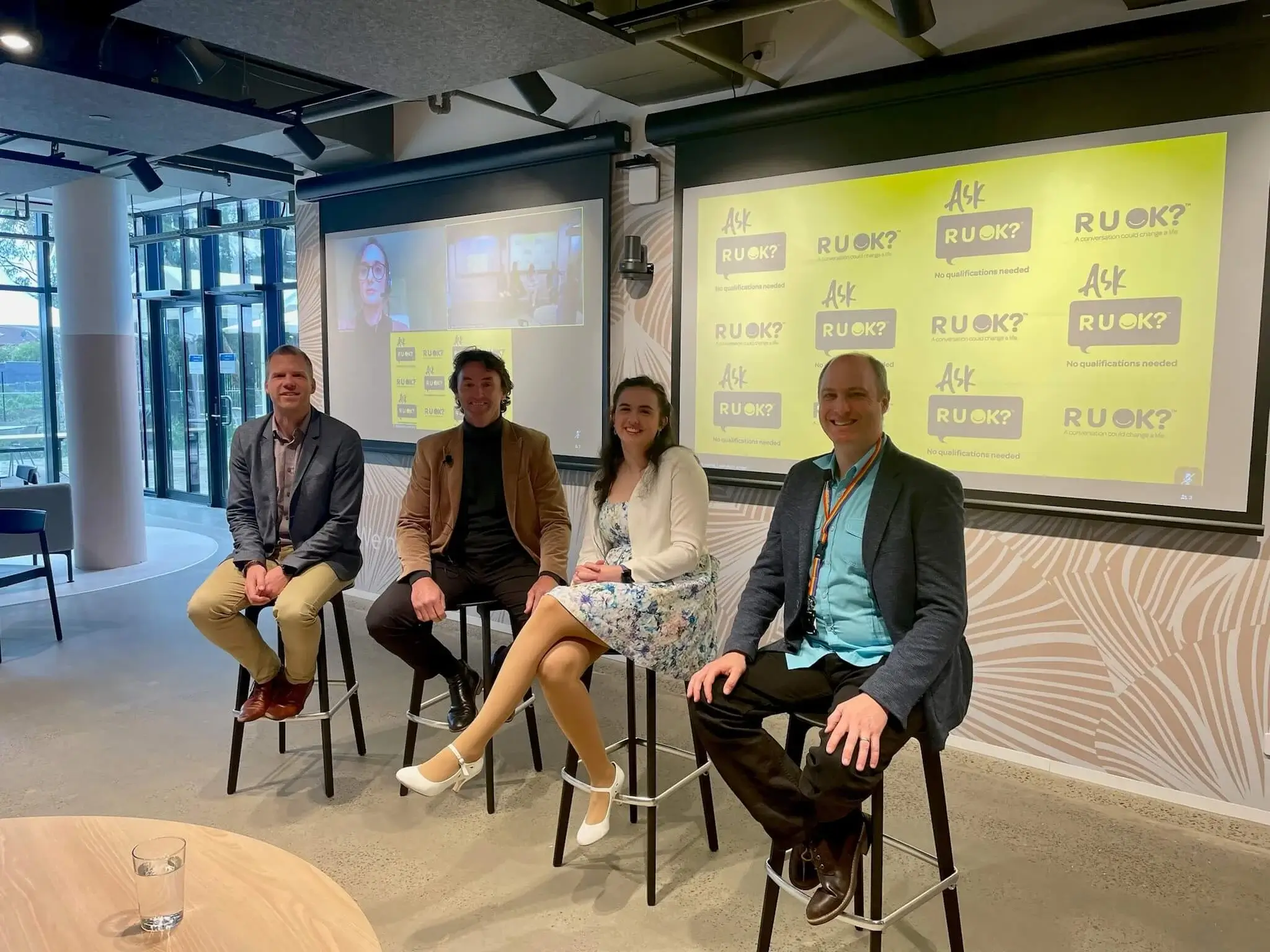In relation to implementing Mental Health First Aid® (MHFA®) training in the workplace, Travis Brown, Learning & Development Lead and Chief Mental Health First Aid Officer for Sanofi Australia & New Zealand says:
“Just do it. The difference before and after the program is like night and day, you won’t regret it!”
Recent global events have cast a spotlight on the importance of supporting healthcare workers as they in turn support others. From doctors, to pharmacists, lab technicians, to those in manufacturing, a lot of staff are needed, to keep up with demand for health products and services in the current environment. Sanofi are a global pharmaceutical and consumer health care provider, that have taken matters into their own hands, by implementing strategies to support the holistic health and wellness of their staff. Their Australian arm has worked hard to proudly be recognised as a Skilled Workplace in the Mental Health First Aid® Australia Workplace Recognition Program.
Sanofi, a French owned multi-national with over 100,000 employees worldwide, has a workforce of 700 people locally, working across 100 sites. Staff come from diverse different backgrounds, and work in a variety of locations, roles, and environments. Since 2018, Sanofi have been successfully implementing Mental Health First Aid (MHFA™) training programs across their Australian sites – going from strength to strength and realising many benefits.
Travis Brown, Learning & Development Lead, is keen to share the organisation’s experiences in the hopes it will encourage other workplaces to follow suit. As an accredited MHFA Instructor she sees first-hand the practical delivery and positive impacts of the courses, not just in her own workplace but in others. Yet just a few years ago she admits, that when it came to mental health, the business really didn’t know where to begin.
“We recognised that staff were experiencing a range of mental health problems resulting in absence and performance management. At first, we didn’t know what to do, other than to refer people to our Employee Assistance program. Team leaders and managers felt ill-equipped to deal with it,” Travis explains.
“So, we started the conversation internally, and one of our managers in Brisbane had seen through LinkedIn that a colleague in the UK had done MHFA training. We got googling, and we then identified a staff member who was already a qualified Instructor, and she became the starting point for us to deliver the training.”
Sanofi began by training only managers, with positive feedback from course participants. Through broader consultation with staff, they came to realise that an employee in need of support, may feel more comfortable talking to a peer rather than their supervisor; therefore, MHFA training at all levels of the organisations was needed.
“We set about getting a real mix of people, from the offices to factory floors, and in the warehouses. We wanted to make sure we had people trained up in each area of the business to really have a good reach. We wanted our MHFAiders (those trained in Mental Health First Aid) to be ‘go to’ people and trusted advisors, who were approachable and accessible.”
The organisation has found such interest and demand for the program, that it can now barely keep up with training. New modes such as online and blended courses are allowing them to respond to this demand, and training two internal MHFA accredited Instructors has improved their capacity. A Site Director in senior management, was one of the first to participate in MHFA training, and now advocates for its delivery across all sites. Having internal champions are often critical to the success of Mental Health First Aid within workplace settings.
Addressing real world needs
MHFA training equips course participants with a broad understanding of developing, worsening and crisis point mental health problems. Instructors are finding that those who attend MHFA training, often relate the signs they observe in colleagues, friends, and family, with issues ranging from eating disorders to suicidal ideation. Equipping staff with the skills, knowledge, and confidence to provide practical, conversation-based interventions, has helped them provide support, not just at work, but also at home and out in their communities.
Sanofi have found that the program fits in seamlessly with their broader Wellness Strategy which focuses on three pillars – financial, mental, and physical health. MHFA training now complements their other organisational programs addressing everything from income protection to domestic violence support, fitness activities and physical health screening. All working together to support the total wellness of staff for a happy and healthy workforce.
Travis explains that it is important to maintain engagement and awareness in a number of ways, to keep mental health at the forefront of staff wellness discussions and planning.

“We make our MHFAiders™ as visible as possible, with online information, photos, and green lanyards. We have posters with our Mental Health First Aid Officer contacts right next to our Physical First Aid Officers. We provide resources, run events, and bring in external mental health speakers. It’s all about keeping an open dialogue, and reinforcing that mental health is as important as our physical health, and that support is available at work.”
Travis Brown – Learning and Development Specialist In Australia
“Our managers tell us anecdotal stories about the shift in mental health conversations and supportive environments. For example, having a supervisor feel comfortable to hold a mental health conversation with an operator on the factory floor, who are often concerned of the mental health of their family and friends. – I think these mean we’ve done something well.
These stories let me know we are on the right path.”
Travis Brown, Learning & Development Lead for Sanofi in Australia
Global recognition and impact
Mental health remains an international health priority, and the World Health Organisation recognises mental illness as a leading cause of disease and disability. While Mental Health First Aid® Australia works with 26 countries worldwide, it is always interesting to hear thoughts about different cultural experiences from our Australian workplaces with an international footprint. Liz recounts a positive cultural shift towards more open mental health conversations over the past four years.
As a result, many Sanofi’s offices including the Singapore office has expressed interest in delivering Mental Health First Aid training. The Sanofi sites in England have already been successfully delivering the training for many years.
“I received an email from our Health & Safety Manager to highlight that we have won an internal Continuous Improvement Award by Sanofi Head Office, in recognition of the work we are doing with mental health in Australia. Then I received a follow-up contact from some of our global sites asking us to share information about this great work with them. The shift is real, and I am so proud that Australians can be leaders in this way.”
“I’ve noticed since COVID-19, conversations about mental health are more common. People are really recognising the importance at times when people are struggling. I have had lots of positive conversations with our team in the UK who do some really cool things, like Mental Health Drop In Cafe’s. We are sharing internal tools and lessons learned across borders, so that we can make our programs even more robust,” says Travis.
Sanofi are making mental health part of their international agenda for staff, in line with the values they espouse for holistic wellbeing, and preventative and frontline healthcare. Mental Health First Aid training has been a key enabler of this.

Measuring success and benefits
In 2019, Sanofi in Australia were recognised in the Mental Health First Aid Workplace Recognition Program. This means they have met a series of criteria to demonstrate their commitment to a mentally healthy workplace, and the embedding of mental health first aid skills and knowledge. They are aiming to renew this acknowledgement and are committed to the longevity of the program.
They measure their impact through program demand and percentage of staff trained, while also acknowledging the difference it has made to business productivity, staff attendance and performance management. Around 100 staff have now received MHFA training, and there are around 90 MHFA Officers appointed in Sanofi sites across Australia.
For those who don’t go on to become active in peer-to-peer support, there are still many benefits. By learning the skills to help someone experiencing a mental health problem or crisis situation, they may be better equipped to seek help if they need it.
However, Travis acknowledges that measuring outcomes isn’t always easy when it comes to mental health, especially with confidentiality in mind. They tend to rely having on internal discussions and qualitative feedback loops, rather than hard metrics.
At Sanofi, the before and after speaks loudly. Staff and managers have gone from feeling reluctant and concerned about how to manage mental health at work, to feeling empowered. They have traction from top to bottom, and global recognition for their efforts.
Travis’ tips
When asked what advice the team could offer other employers considering embarking on Mental Health First Aid training in their workplace, they offer the following pointers:) Give it a try, because you’ll quickly see how practical and well-received the program is and how easily it can be scaled up.
- Carefully consider who you need to train (levels, positions and locations) to get the right impact for your workforce. Who will your ‘go to’ people be?
- Get buy-in from leadership and management, but then get your people on the ground at all levels. This training is for everyone, not just senior staff.
- Consider train-the-Instructor approach to build your internal capacity for a sustainable program.
- Make your Mental Health First Aiders® and MHFA Officers connected and visible and look for ways to keep mental health dialogues open. Think about integration with broader wellness strategies, accessibility across sites, action at internal meetings, and engagement at employee events.
- Celebrate your successes. Share stories across the business. Go to the next level to maximise the benefits to become recognised in the Mental Health First Aid Australia Workplace Recognition Program.
To find out more about Mental Health First Aid training for your workplace visit mhfa.com.au
To learn more about gaining recognition within the Mental Health First Aid Workplace Recognition Program visit mhfa.com.au/workplacerecognition



